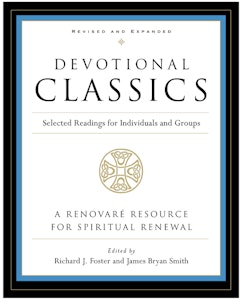Introductory Note:
Getting started in the spiritual life can be overwhelming. How does one dip a toe into the ocean of Life that awaits us? I think C.S. Lewis would suggest that we don’t dip, we dive. No half measures will do—Christ says, “Jump.” In this Devotional Classics excerpt, Lewis encourages us to abandon the idea of just “being good,” and to embrace utter abandonment to God. Step by step, Lewis walks us through the challenge and then offers us a practical exercise for getting started. He ends with a beautiful vision of being drawn into Christ. Here’s a sneak peek:
What we have been told is how we can be drawn into Christ—can become part of that wonderful present which the young Prince of the universe wants to offer his Father—that present which is Himself and therefore us in Him. It is the only thing we were made for.
Jonathan R. Bailey
 Excerpt from Devotional Classics
Excerpt from Devotional Classics
1. How Much of Myself Must I Give?
The ordinary idea which we all have before we become Christians is this. We take as the starting point our ordinary self with its various desires and interests. We then admit that something else — call it “morality” or “decent behavior,” or “the good of society” — has claims on this self: claims which interfere with its own desires. What we mean by “being good” is giving in to those claims. Some of the things the ordinary self wanted to do turn out to be what we call “wrong”: well, we must give them up. Other things turn out to be what we call “right”: well, we shall have to do them.
But we are hoping all the time that when all the demands have been met, the poor natural self will still have some chance, and some time, to get on with its own life and do what it likes. In fact, we are very like an honest man paying his taxes. He pays them all right, but he does hope that there will be enough left over for him to live on. Because we are still taking our natural self as the starting point.
2. Two Results
As long as we are thinking that way, one or the other of two results is likely to follow. Either we give up trying to be good, or else we become very unhappy indeed. For, make no mistake: if you are really going to try to meet all the demands made on the natural self, it will not have enough left over to live on. The more you obey your conscience, the more your conscience will demand of you. And your natural self, which is thus being starved and hampered and worried at every turn, will get angrier and angrier.
In the end, you will either give up trying to be good, or else become one of those people who, as they say, “live for others” but always in a discontented, grumbling way — always wondering why the others do not notice it more and always making a martyr of yourself. And once you have become that you will be a far greater pest to anyone who has to live with you than you would have been if you had remained frankly selfish.
3. Harder and Easier
The Christian way is different: harder, and easier. Christ says, “Give me All. I don’t want so much of your time and so much of your money and so much of your work: I want You. I have not come to torment your natural self, but to kill it. No half-measures are any good. I don’t want to cut off a branch here and a branch there, I want to have the whole tree down. Hand over the whole natural self, all the desires which you think innocent as well as the ones you think wicked — the whole outfit. I will give you a new self instead. In fact, I will give you Myself: my own will shall become yours.”
Both harder and easier than what we are all trying to do. You have noticed, I expect, that Christ Himself sometimes describes the Christian way as very hard, sometimes as very easy. He says, “Take up your Cross” — in other words, it is like going to be beaten to death in a concentration camp. Next minute he says, “My yoke is easy and my burden light.” He means both. And one can just see why both are true.
4. The Most Dangerous Thing
Teachers will tell you that the laziest boy in the class is the one who works the hardest in the end. They mean this. If you give two boys, say, a proposition in geometry to do, the one who is prepared to take trouble will try to understand it. The lazy boy will learn it by heart because, for the moment, that needs less effort. But six months later, when they are preparing for the exam, that lazy boy is doing hours and hours of miserable drudgery over things the other boy understands, and positively enjoys, in a few minutes.
Laziness means more work in the long run. Or look at it this way. In a battle, or in mountain climbing, there is often one thing which it takes a lot of pluck to do; but it is also, in the long run, the safest thing to do. If you funk it, you will find yourself, hours later, in far worse danger. The cowardly thing is also the most dangerous thing.
5. The Almost Impossible Thing
It is like that here. The terrible thing, the almost impossible thing, is to hand over your whole self — all your wishes and precautions — to Christ. But it is far easier than what we are trying to do instead. For what we are trying to do is to remain what we call “ourselves,” to keep personal happiness as our great aim in life, and yet at the same time be “good.” We are all trying to let our mind and heart go their own way — centered on money or pleasure or ambition — and hoping, in spite of this, to behave honestly and chastely and humbly.
And that is exactly what Christ warned us you could not do. As He said, a thistle cannot produce figs. If I am a field that contains nothing but grass-seed, I cannot produce wheat. Cutting the grass may keep it short: but I shall still produce grass and no wheat. If I want to produce wheat, the change must go deeper than the surface. I must be ploughed up and re-sown.
6. Listening to That Other Voice
That is why the real problem of the Christian life comes where people do not usually look for it. It comes the very moment you wake up each morning. All your wishes and hopes for the day rush at you like wild animals. And the first job each morning consists simply in shoving them all back; in listening to that other voice, taking that other point of view, letting that other larger, stronger, quieter life come flowing in. And so on, all day. Standing back from all your natural fussings and frettings; coming in out of the wind.
We can only do it for moments at first. But from those moments the new sort of life will be spreading through our system: because now we are letting Him work at the right part of us. It is the difference between paint, which is merely laid on the surface, and a dye or stain which soaks right through.
He never talked vague, idealistic gas. When He said, “Be perfect,” He meant it. He meant that we must go in for the full treatment. It is hard; but the sort of compromise we are all hankering after is harder — in fact, it is impossible. It may be hard for an egg to turn into a bird: it would be a jolly sight harder for it to learn to fly while remaining an egg. We are like eggs at present. And you cannot go on indefinitely being just an ordinary, decent egg. We must be hatched or go bad.
7. The Reason the Church Exists
May I come back to what I said before? This is the whole of Christianity. There is nothing else. It is so easy to get muddled about that. It is easy to think that the Church has a lot of different objects — education, building, missions, holding services. Just as it is easy to think the State has a lot of different objects — military, political, economic, and what not.
But in a way things are much simpler than that. The State exists simply to promote and to protect the ordinary happiness of human beings in this life. A husband and wife chatting over a fire, a couple of friends having a game of darts in a pub, a man reading a book in his own room or digging in his own garden — that is what the State is there for. And unless they are helping to increase and prolong and protect such moments, all the laws, parliaments, armies, courts, police, economics, etc., are simply a waste of time.
In the same way the Church exists for nothing else but to draw men into Christ, to make them little Christs. If they are not doing that, all the cathedrals, clergy, missions, sermons, even the Bible itself, are simply a waste of time. God became Man for no other purpose. It is even doubtful, you know, whether the whole universe was created for any other purpose. It says in the Bible that the whole universe was made for Christ and that everything is to be gathered together in Him.
8. Becoming a Part of the Plan
I do not suppose any of us can understand how this will happen as regards the whole universe. We do not know what (if anything) lives in the parts of it that are millions of miles from this Earth. Even on this Earth we do not know how it applies to things other than men. After all, that is what you would expect. We have been shown the plan only in so far as it concerns ourselves.
What we have been told is how we can be drawn into Christ — can become part of that wonderful present which the young Prince of the universe wants to offer his Father — that present which is Himself and therefore us in Him. It is the only thing we were made for. And there are strange, exciting hints in the Bible that when we are drawn in, a great many other things in Nature will begin to come right. The bad dream will be over: it will be morning.
Excerpts taken from Devotional Classics: Selected Readings for Individuals and Groups (Richard J. Foster & James Bryan Smith, Editors. HarperCollins, 1993.).
Photo by Denis Sebastian Tamas on Unsplash
· Last Featured on Renovare.org August 2023


